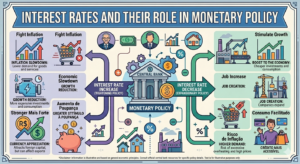Navigating the financial world can be intimidating, but mastering a few key skills can set you on the path to financial success. From budgeting to investing, understanding these essential financial skills can transform your relationship with money and help you achieve your goals.
Understanding Personal Finance
Personal finance is all about managing your money to meet your personal goals. It includes everything from budgeting and saving to investing and planning for retirement. Being financially savvy isn’t just about having money—it’s about making informed decisions that enhance your quality of life.
Key Financial Skills Everyone Should Know
1. Budgeting: The Foundation of Financial Health
Creating a budget is like building a roadmap for your finances. It helps you see where your money is going and ensures you’re living within your means. Here’s how to get started:
- Track your spending: Monitor your expenses for a month to see where your money is going.
- Set spending limits: Allocate money for necessities, wants, and savings. A common rule is the 50/30/20 method:
- 50% for needs (housing, groceries, transportation)
- 30% for wants (dining out, hobbies, entertainment)
- 20% for savings and debt repayment
- Review and adjust: Regularly review your budget and adjust as needed to stay on track.
2. Saving: Preparing for the Unexpected
Building savings is crucial for financial security. It can protect you from unexpected expenses and help you reach long-term goals. Consider these strategies:
- Start an emergency fund: Aim for three to six months’ worth of expenses.
- Automate savings: Set up automatic transfers to your savings account to build consistency.
- Save for specific goals: Whether it’s a vacation, a car, or a home, having a clear goal can motivate you to save.
3. Investing: Making Your Money Work for You
Investing might seem complex, but it’s a powerful tool for building wealth over time. The key is to start early and be consistent.
- Diversify: Spread your investments across different assets to reduce risk. Think stocks, bonds, real estate, and mutual funds.
- Understand risk: Higher returns often come with higher risks. Choose investments that match your risk tolerance.
- Stay informed: Keep learning about market trends and investment options to make informed decisions.
4. Managing Debt: Keeping It Under Control
Debt isn’t inherently bad, but unmanaged debt can be crippling. Understanding how to handle debt wisely is essential.
- Prioritize high-interest debt: Pay off credit cards and other high-interest loans first.
- Consolidate when possible: Combining debts into a single loan can sometimes reduce interest rates and simplify payments.
- Avoid unnecessary debt: Only take on debt that will benefit you in the long run, like a mortgage or student loans.
5. Building Good Credit
Your credit score impacts your ability to borrow money and the interest rates you’ll pay. Maintaining a good credit score is key.
- Pay bills on time: Late payments can severely hurt your credit.
- Keep balances low: High credit utilization can lower your score.
- Monitor your credit report: Regularly check for errors or fraudulent activity.
Developing a Financial Mindset
Beyond skills, cultivating a healthy financial mindset is crucial. This means being proactive about your finances, continuously learning, and not being afraid to seek advice when needed. Remember, financial well-being is a journey, not a destination.
Conclusion
Mastering these essential financial skills can pave the way to a more secure and fulfilling life. By budgeting wisely, saving diligently, investing thoughtfully, and managing debt effectively, you’ll build a strong financial foundation. Start today, and your future self will thank you!







